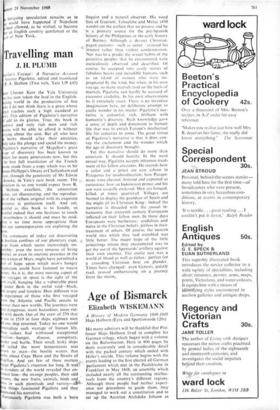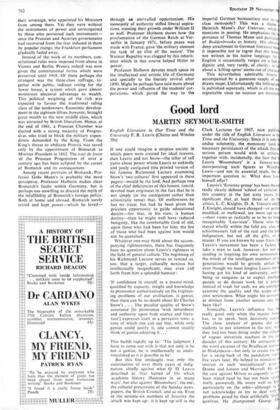Age of Bismarck
Elizabeth WISKEMANN
A History of Modern Germany 1840-1945 Hajo Holborn (Eyre and Spottiswoode 120s) His many admirers will be thankful that Pro- fessor Hajo Holborn lived to complete his German trilogy, which began with a volume on the Reformation. Here in 800 pages he deals accurately and in considerable detail with the packed century which ended with Hitler's suicide. This volume begins with the events leading to the first elected all-German parliament which met in the Paulskirche in Frankfurt in May 1848, an assembly which included nearly all the outstanding intellec- tuals from the country's different regions. Although these people had neither experi- ence nor precedents to guide them, they managed to work out a constitution and to set up the Austrian Archduke Johann as His many admirers will be thankful that Pro- fessor Hajo Holborn lived to complete his German trilogy, which began with a volume on the Reformation. Here in 800 pages he deals accurately and in considerable detail with the packed century which ended with Hitler's suicide. This volume begins with the events leading to the first elected all-German parliament which met in the Paulskirche in Frankfurt in May 1848, an assembly which included nearly all the outstanding intellec- tuals from the country's different regions. Although these people had neither experi- ence nor precedents to guide them, they managed to work out a constitution and to set up the Austrian Archduke Johann as
their sovereign, who appointed his Ministers from among them. Yet they were without the instruments of power and unrecognised by those who possessed such instruments— once the Prussian and Austrian governments had recovered from the fear induced in them by popular risings, the Frankfurt parliament gradually faded away.
Instead of the work of its members, con- stitutional rules were imposed from above in Vienna and Berlin; Prussia indeed was now given the constitutional forms which were preserved until 1918. Of these perhaps the strangest was the three-class suffrage, to- gether with public, indirect voting for the lower house, a system which gave almost monstrous electoral advantage to wealth. This political weighting of the rich was expected to favour the traditional ruling class of the landowners. Economic develop- ment in the eighteen-fifties, however, brought great wealth to the new middle class, which was attracted by British liberalism. Hence, at the end of 1861, a Prussian Chamber was elected with a strong majority of Progres- sives who tried to block the military expen- diture demanded by the King. From the King's threat to abdicate Prussia was saved only by the appointment of Bismarck as Minister-President in 1862. The tour de force of the Prussian Progressives of over a century ago has been eclipsed by the career of Bismarck and its consequences.
Among recent portraits of Bismarck, Pro- fessor Golo Mann's is probably the most perceptive. Professor Holborn makes clear Bismarck's faults within Germany, but is perhaps too unwilling to discard the myth of the infallibility of Bismarck's foreign policy. Both at home and abroad, Bismarck surely seized and kept power—which he loved— through an unrivalled opportunism. His monopoly of authority stifled liberal aspira- tions, stunting their growth under William II as well. Professor Holborn shows how the proclamation of the German Reich at Ver- sailles in January 1871, before peace was made with France, gave 'the military element the rank of an elite of the nation'. The Weimar Republic was clogged by this inherit- ance which in due course helped Hitler to power.
Professor Holborn devotes much space to the intellectual and artistic life of Germany and specially to the literary revival after 1890. Might he perhaps have said more about the power and influence of the students' cor- porations, which paved the way to the
imperial German bureaucracy and its class monopoly? This was a theme Heinrich Mann's Der Untertan, which mentions in passing: He emphasises the portance of Thomas Mann and particul of Buddenbrooks as history. His obvio deep attachment to German literature rn it impossible not to regret that this book not written in his native language: for English it occasionally verges on a lack dignity and, very rarely, of clarity: to about a 'killing-spree' seems out of charac This nevertheless admirable history accompanied by a generous supply of w drawn maps. Unfortunately the bibliogra is published separately, which is all the regrettable since no sources are mentio











































 Previous page
Previous page